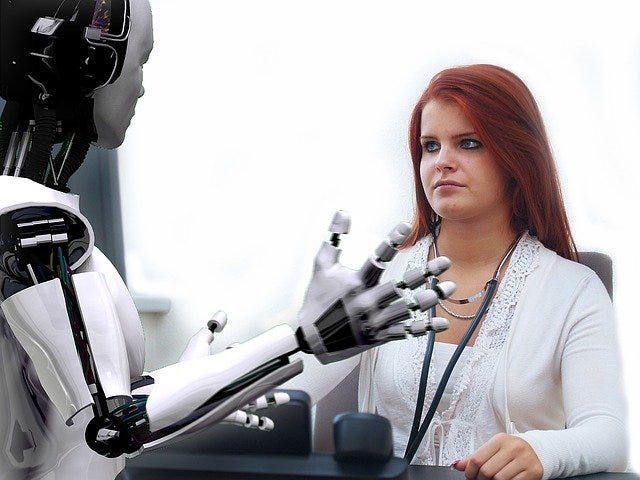# The Hidden Job Crisis: How AI is Reshaping Recruitment
Written on
Understanding the Current Job Landscape
Since the world began to recover from the initial Covid-19 outbreak, the news surrounding job markets has generally been bleak. While President Joe Biden has celebrated record job creation during his first year, many news outlets are preoccupied with the phenomenon known as the "Great Resignation." This isn't unfounded, as American workers are quitting in unprecedented numbers. In November 2021 alone, 4.5 million people resigned, seeking more meaningful employment. However, the true issue behind the current employment crisis is often overlooked, and it stems from a source that isn't even human.
At first glance, one might think that the mass resignation would make job hunting easier. Yet, many job seekers report otherwise. “I went through 80 interviews before landing a new job after losing my last one,” lamented a marketing MBA in a recent op-ed for Business Insider. This troubling trend, referred to as "brain waste," has been highlighted by the BBC as a growing concern that many aren't aware of.
Why is Job Hunting So Challenging?
Securing a job was already a challenge prior to the pandemic. Generation Z workers who plan to leave their jobs this year might reconsider if they understood the hardships faced by previous generations. This raises an important question: why are so many skilled and educated individuals struggling to find work in their fields?
Many companies have been attempting to streamline their hiring procedures. Unfortunately, this has led to an increased reliance on artificial intelligence (AI) technology. Although AI has been gradually integrated into recruitment for years, the pandemic accelerated this trend. As noted by the Wall Street Journal:
“By automating formerly manual tasks—such as pre-screening applicants for basic qualifications, verifying professional credentials and licenses, or scheduling follow-up interviews—employers aim to expedite the hiring process and secure talent before their competitors do.”
The Downsides of AI in Recruitment
This brief overview encapsulates the primary issue surrounding AI in recruitment. The systems used by companies filter applications by scanning resumes and cover letters for specific keywords. If a resume lacks these terms, the applicant may be instantly rejected. As Vox pointed out in September 2021, this trend has led to many resumes never reaching human eyes. This situation is detrimental to both candidates and employers. When machines reject candidates outright, companies risk overlooking qualified individuals who simply used different terminology in their applications.
Moreover, some AI systems flag gaps in employment history, which should be explained by the applicant. Individuals may have taken time off to care for a sick relative or found themselves unemployed due to pandemic-related disruptions. It’s unjust for prospective employees to be penalized for circumstances beyond their control.
I have experienced this firsthand. After graduating, I applied for an entry-level position in the Foreign Affairs department of a well-known management consulting firm. Within an hour, I received an automated rejection email. I later reapplied for the same role when it reappeared on LinkedIn, only to receive the exact same outcome.

Image by Thomas Meier from Pixabay
Sadly, my situation isn't unique. Job platforms like Indeed and ZipRecruiter have become flooded with applications where candidates can submit their resumes with a mere click. Unfortunately, for many job seekers, that’s often where their journey ends. According to a 2021 report from Harvard Business School and Accenture, AI tools have barred 27 million individuals from securing jobs in their desired fields. Perhaps business leaders lamenting the labor shortage should reassess their hiring practices.
Finding a Path Forward
What can be done to address this issue? An article from Inc provided some insightful perspectives. One such viewpoint came from Josh Constine, a principal investor at the early-stage venture capital firm SignalFire. He suggested, “Allow algorithms to broaden your candidate pool and apply lookalike matching based on your top-performing talent, but utilize humans to look beyond credentials and select candidates who align with your values.”
This perspective resonates strongly. It highlights the necessity for human judgment in evaluating other individuals. I challenge the engineers and data scientists behind these AI advancements to heed Constine’s advice: leverage data on successful employees to discover candidates with similar skills, rather than automatically dismissing those whose resumes differ slightly. Ultimately, companies benefit most from hiring based on values, which cannot be adequately measured through quantitative means.
Chapter 2 Title
The first video, "Artificial Intelligence: The Robots Are Now Hiring | Moving Upstream," explores the intersection of AI and job recruitment, detailing how technology is reshaping the hiring landscape.
The second video, "AI is not a threat to human jobs. It's an opportunity to create new ones," discusses the potential of AI to generate new job opportunities rather than eliminate them.